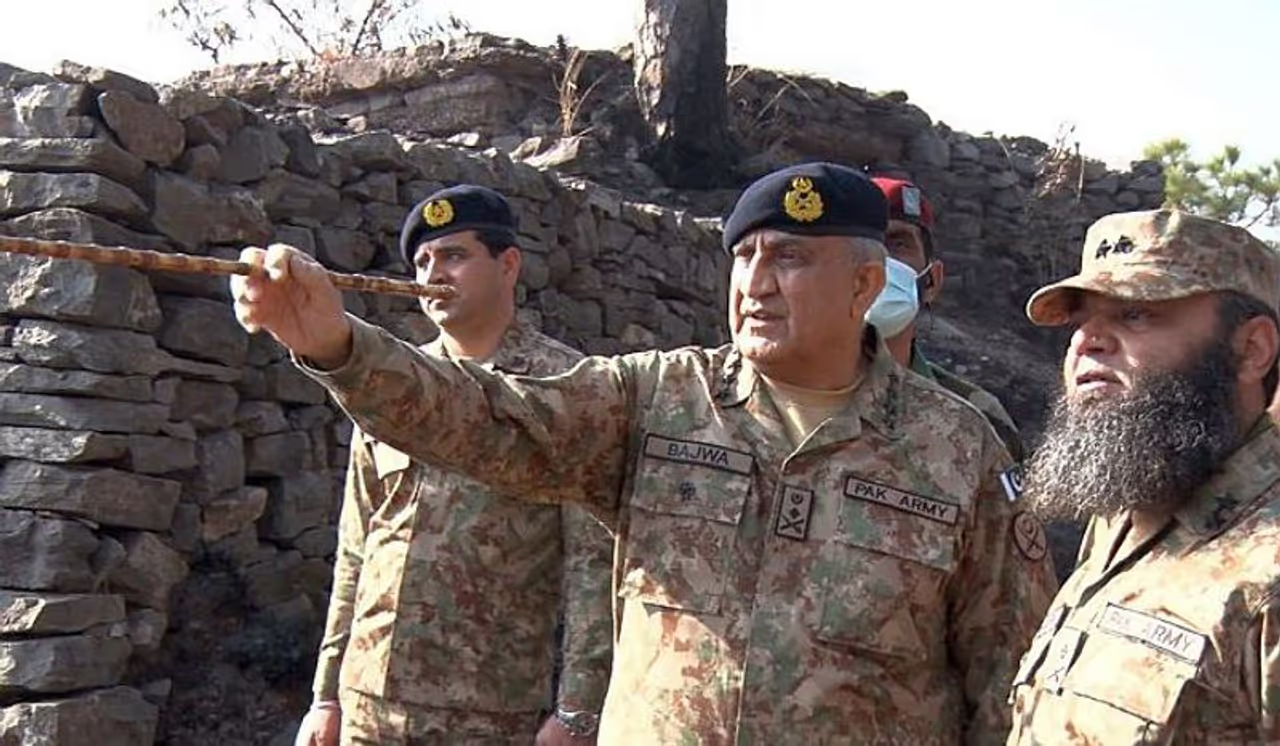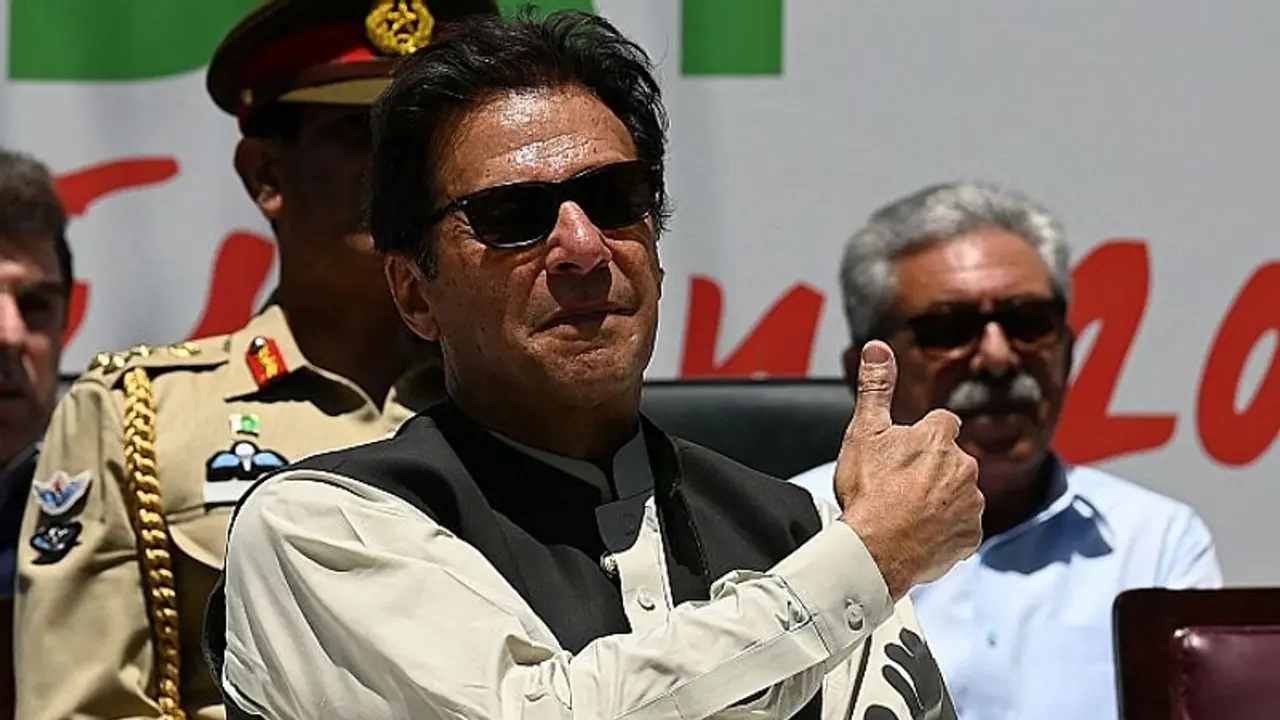The only thing that could save Imran Khan is a last-minute deal with the military. After all, the Pakistan army continues to hold the levers of power in that country, says Major General Sudhakar Jee (Retd)
The core principles and values of Pakistan's deep state -- its Army and Inter-Services Intelligence -- is driven by policies of treating India as arch-rival and existential threat, the Kashmir dispute, Islamisation of Pakistan, maintaining Punjab as the heartland of Pakistan, strategic use of non-state terrorists and the formation of alliances with other Muslim-majority nations in the world, especially the Middle East for 'aid, ideology and strategic cooperation.
Pakistan Tehereek-e-Insaf was created by Imran Khan in 1996, the period marked by terrorism and urban violence in South Asia. He continued as a fringe player while political giants like Nawaz Sharif and Benazir Bhutto dominated the democratic landscape of Pakistan.

Also Read: 3 reasons why Imran Khan lost Pakistan Army's trust and will lose PM's chair
The PTI launched the 'Naya Pakistan' campaign in 2013, which ultimately catapulted Khan to power in 2018. Khan became the 22nd Prime Minister of Pakistan on August 18, 2018. His campaign against Nawaz Sharif stood on the anti-corruption plank. He accused Sharif and his family members of stashing fortunes abroad.
It may be recalled that Sharif had been disqualified by the Supreme Court of Pakistan from holding public office leading to a pre-election interim political arrangement under Prime Minister Shahid Khaqan Abbasi of the PML-N.
Imran Khan defeated the PML-N in the election of July 2018 while Nawaz Sharif remained in jail. The Pakistan Democratic Movement (PDM) and the PML-N consistently alleged that the election was rigged by the military establishment -- the real back-room players of Pakistani democracy -- which favoured Khan as Sharif had refused to play as per the military rulebook.
Pakistan, as per the World Bank, is among the top 10 countries with the largest foreign debt. It has failed to revive its productive sectors and continues to remain dependent on external financing with heavy and extremely serious debt-servicing spirals. Pakistan, having been on the grey list of the Paris-based Financial Action Task Force since June 2018 for failing to check money laundering leading to terror financing, is losing annually about $12 billion or more owing to restrictions imposed on the inflow of FDI. It is in deep economic crisis with the country needing gross external financing of $51.6 billion, taking very conservative estimates assessed by the IMF within a two-year period (2021-2023), in order to fulfil its needs.
Khan and his government failed to provide any stable solution to the economic problems. The economic crisis in the country has resulted in double-digit high inflation, rising unemployment, poverty, terrorism, deteriorating law and order situation -- far off from the rational technocratic leadership that he had promised.
Gifted with geostrategic significance being a part of the 'Golden Crescent' as well as being at the 'epicentre of global terrorism' coupled with serious allegations of corruption allegedly involving his close relatives, Khan attracted declining popularity in his own political party and country. Worldwide too, Pakistan has been isolated in almost everything.
Pakistan has witnessed nothing but turmoil in its political climate ever since its creation based on the two-nation theory and language. Pakistan Army has constantly meddled in its national politics wherein Franksteins have been created to deliver justice with political biases.
Also Read: MQM-Pakistan: The ally who sank Imran Khan's ship
General elections of July 25, 2018, had, thus, pre-decided a puppet government to play second fiddle. Pakistan Army controls the government and the country's nuclear weapons. If any civil government tries to cross the red line drawn by the deep state over any issue, it is tantamount to rebellion.

Image: Pakistan Army Chief General Qamar Javed Bajwa inspecting a forward base. Photograph: DGISPR/Twitter
National security and patriotism are the pretexts used by Pakistan's deep state to sustain its influence. A deep state would never let a civilian government to assert or strengthen its position.
Being on shaky grounds, Khan's much-speculated moment of reckoning arrived on March 28, 2022, when the leader of the opposition Shehbaz Sharif tabled a no-trust resolution against his government in the National Assembly. With 161 lawmakers voting in favour, the resolution was accepted for a no-trust motion against the Prime Minister.
According to the rulebook, at least 20 per cent of votes -- working out to 68 legislators in the 342-member National Assembly -- are required for the same. For a no-trust move to succeed, the opposition needs votes from at least 172 lawmakers.
The opposition with the current number of 170 in the house, Muttahida Qaumi Movement-Pakistan with seven lawmakers, Balochistan Awami Party with five lawmakers, Muttahida Qaumi Movement-Pakistan with seven lawmakers undecided, one member of PML-Q of five members have decided to join the opposition, more than two dozen dissident lawmakers of Imran's Party tipped to vote for the opposition's motion against the PM.
This clearly indicates the opposition's resolve to push through a no-trust motion. Khan's problems are compounded by the fact that he is facing dissidents within his own party, PTI.
But what really seems to have got Khan in a jam is the perceived withdrawal of support to his government by the Pakistan army. The slide began in October last year when Khan and Pakistan army chief General Qamar Bajwa engaged in a public standoff over the appointment of the ISI chief. Khan ultimately did not get his way, but the episode is seen to have damaged his relations with the military. Add to this, allegations of economic mismanagement, foreign policy and corruption, and Khan certainly finds himself in a tight spot.
Notwithstanding his show of strength through a massive rally on March 27, 2022, where he alleged that foreign powers were trying to unseat him, the only thing that could save Khan is a last-minute deal with the military. After all, the Pakistan army continues to hold the levers of power in that country.
Also Read: Reverse swing in Imran Khan's political fortunes
Pakistan Army, being the deep state behind any civil government in power, continues to use terrorism as an instrument of state policy against India and Afghanistan. There is no evidence to suggest a change of its view on the subject.
Being in the driver's seat with the return of the Taliban in Kabul, which continues to deny India's long-term Afghan interests, the Pakistani deep state's status is further strengthened and fortified. Further, militancy in Kashmir has entered a new phase of targeted killings with the help of Pakistani handlers across the border coupled with the current poor state of India-China relations and Beijing's all-weather friendship with Islamabad, New Delhi should guard against the China-Pakistan axis working against it.
With Pakistan cosying up to Russia against the backdrop of the Ukraine war and the maritime security around the Maldives and Sri Lanka throwing up new challenges, India must remain extra alert.
Pakistan's political fate being in the hands of the Pakistan army can make or break governments and as long as the Pakistani military-ISI complex continues to see India as its primary enemy, no government in Islamabad will ever have peace in its wildest of dreams with New Delhi.
The author is a retired Indian Army Officer. He was former colonel of the Mahar Regiment. He comments on geo-politics, strategy and security at global, regional and national levels.
